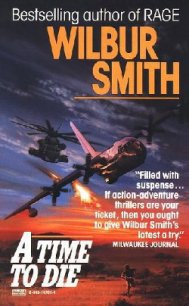Elephant Song - Smith Wilbur (читать книги онлайн бесплатно полностью без .TXT) 📗
Then slowly his anger evaporated and the seriousness of his own predicament began to sink in. He had acted wildly and dangerously. He had made accusations which he could not support; he had damaged property, and he had endangered life and committed aggravated assault on a government official, if not grievous bodily harm. They could get him on half a dozen charges.
Then once again he thought of Johnny and his family, and his personal peril was of no significance.
I was so close to breaking the whole scheme, he thought bitterly.
Another few minutes with Gomo and I would have had them. I almost had them for you, Johnny.
He had to decide on his next actions, but his head was aching, and it was hard to think logically. There was no point in chasing after Gomo.
He was alerted, and he had somehow managed to get rid of the ivory.
What other courses of action were open to him? Ning Cheng Gong, of course. He was the key to the entire plot. However, the only connection to him, now that the ivory had disappeared, was Johnny's cryptic note and the footprint he had left at the murder scene.
Then there was Chetti Singh. Gomo had tacitly admitted that he knew the Sikh. What had he said when Daniel had tried him with the name?
Yes, I tell you about him, if you don't cut me. . .
There was also the band of poachers. He wondered if Isaac Mtwetwe had been able to intercept the gang on the Zambezi crossing, and take prisoners. Isaac would not have the same scruples as Jock. Johnny had also been Isaac's friend. He would know how to get information out of a captured poacher. I'll ring Mana Pools from the police post at Chirundu, he decided, and started the Landcruiser. He U-turned and headed back down the escarpment. The Chirundu bridge police station was closer than Karoi. He had to make a statement to the police and make sure that a police investigation was under way as soon as possible. The police must be warned about Johnny's note and the bloody footprints.
Daniel's head still ached. He stopped the Landcruiser for a few minutes while he found a bottle of Panadol tablets in the first-aid kit and washed down a couple of them with a mug of coffee from the vacuum flask.
While he drove on the pain abated and he started to put his thoughts into order.
It was almost four o'clock in the morning when he reached Chirundu bridge. There was a solitary corporal in the police charge office.
His arms were folded on the desk in front of him, cradling his head.
He was so soundly asleep that Daniel had to shake him vigorously, and his eyes were swollen and bloodshot when at last he raised his head, and blinked uncomprehendingly at Daniel. I want to report a murder, a multiple murder. Daniel began the long laborious process of getting the official machinery in motion.
When the corporal seemed unable to decide upon the correct procedure, Daniel sent him to call the member-in-charge from his rondavel at the back of the station house. When the sergeant came into the charge office at last, he was dressed in full uniform, including Sam Browne belt and cap, but he was still half asleep. Ring CID in Harare, Daniel urged him.
They must send a unit to Chiwewe. First you must make a statement, the sergeant insisted.
There was no typewriter in the charge office; this was a remote rural station. The sergeant took down Daniel's statement in halting childlike longhand. His lips moved as he spelled out each separate letter silently. Daniel wanted to take the ballpoint away from him and get it down himself.
Damn it, sergeant. Those dead people are lying out there.
The killers are getting away while we sit here. The sergeant went on placidly with his composition, and Daniel corrected his spelling and turned with exasperation.
However, the pace of the dictation allowed him to phrase his statement carefully. He set down the timetable of the previous day's events: the time that he had left Chiwewe and said goodbye to Johnny Nzou; the time he had found the signs of the raiding party and decided to return to the headquarters camp with a warning; and the time that he had met the refrigerator trucks on the road in company with the ambassador's Mercedes.
He described his conversation with Ambassador Ning and hesitated, wondering whether to mention the bloodstain that he had noticed on his blue slacks. it would sound like an accusation.
The hell with protocol, he decided, and described in detail the blue slacks and the training shoes with fish-scale patterned soles. They'll have to investigate now. He felt a grim satisfaction, as he went on to describe his return to Chiwewe and the carnage he had found there.
He made sure to mention the note in Johnny's hand and the fishscale pattern of the bloody footprint on the office floor without specifically relating either to the Taiwanese ambassador. Let them make their own inferences.
He had a great deal of difficulty when it came to describing his pursuit of the Mercedes and the refrigerator trucks. He had to give his motives without incriminating himself, or pointing too definitely at the suspicions he entertained towards Ning Cheng Gong. I followed the convoy to ask them if they had any knowledge of the missing ivory, he dictated.
Although I was unable to catch up with Ambassador Ning and the leading truck, I did speak to Ranger Gomo whom I met on the Karoi road and who was driving the second refrigerator truck. He denied any knowledge of these events and allowed me to inspect the contents of the truck. I found no ivory. It galled him to have to admit this, but he had to cover himself against any charges that Gomo might bring against him later. I then determined that my duty was to contact the nearest police station and report the deaths of the Chiwewe warden, his family and staff, and the burning and destruction of buildings and other property. It was well after daybreak when Daniel could at last sign the handwritten statement, and only then would the police sergeant respond to his urging to telephone CID headquarters in Harare.
This led to a protracted telephone discussion between the sergeant and a series of increasingly senior detectives in Harare as one passed him on to the other. This was the pace of Africa and Daniel gritted his teeth.
AWA, he told himself. Africa Wins Again. At last it was ordered that the sergeant should drive out to Chiwewe camp in the station Landrover while a team of detectives flew down from Harare to land at the Park's airstrip. Do you want me to come out with you to Chiwewe?
Daniel asked, when the sergeant finally relinquished the telephone and began preparations for his expedition to the camp.
The sergeant looked nonplussed by the question. He had received no instructions from CID as to what to do with the witness. You leave an address and telephone number where we can contact you if we need you, he decided, after a great deal of frowning thought.
Daniel was relieved to be turned loose. Since arriving at the Chirundu police station, he had had many hours in which to consider the situation, and make his plans to cover every contingency.
If Isaac Mtwetwe had been able to capture any of the poachers, that would still be the swiftest path to Ning Cheng Gong, but he had to talk to Isaac before he handed over his prisoners to the police. I want to use your telephone, he told the police corporal as soon as the station commander and his unit of armed constables had driven away in the green Landrover, heading for Chiwewe. Police telephone. The corporal shook his head.
Not public telephone. Daniel produced a blue ten Zim dollar note and laid it on the desk in front of him. It is only a local call, he explained, and the banknote vanished miraculously. The corporal smiled and waved him towards the telephone. Daniel had made a friend.




